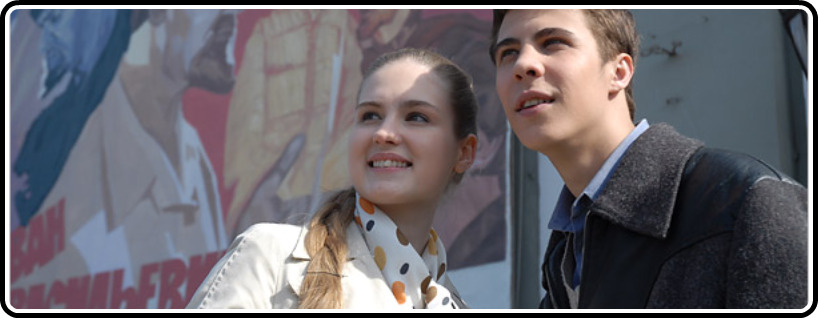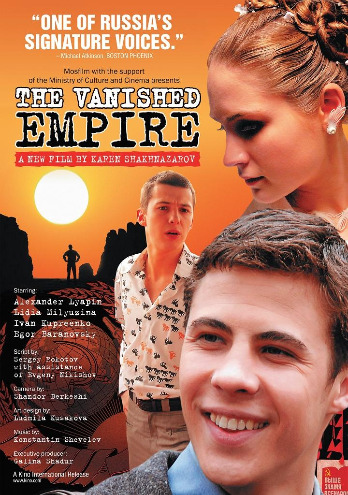‘The Vanished Empire‘ came out of left field to this viewer, especially when it comes to a part of youth that I never thought about in the first place. Soviet youth sounds like it would be about war torn Russia, at least to a close-minded individual, but watching the new film by Karen Shakhnazarov, it shows us that no matter what time and country it might be set in, a film about teenagers tends to be about the same thing: friends, girls, betrayal, school, banned rock music and the collapse of a society around them.
The film follows Sergey Narbekov (Alexander Lyapin), who is a student in 1973 Moscow, who likes Lyuda (Lidiya Milyuzina) and wishes to impress her any chance he gets. One moment in the film is when he thinks he’s bought a mint LP of the Rolling Stones’ “Goat’s Head Soup” for Lyuda, but when he opens it in front of her, it is a copy of Tchaikovsky’s “Swan Lake”. She doesn’t mind, she likes the score, so all is no lost.
Shakhnazarov is a talented director who deserves some recognition here in this part of the world. ‘The Vanished Empire‘ works perfectly as a coming of age story, but as opposed to most of those films, this one deals more with Russian youth culture and how they are going forward toward a future that isn’t certain. A society that bans rock music, such as The Rolling Stones, The Beatles’¦ hell, even The Archies “Sugar, Sugar” is a call to arms to these kids who have to secretly listen to these songs in order to ‘fight the power’, so to speak.
The screenplay, by Sergey Rokotov and Evgeny Nikishov, shows a city that is much more dilapidated than 70’s London or New York City, and the relationships between not only Sergey’s friends but also his family as well, especially his grandfather (Armen Djigarkhanyan), who is a well respected archaeologist who did the major excavation of the ancient Khorezm civilization in present day Uzbekistan. Which then has some great surreal moments, such as Sergey’s first use of marijuana, which takes him to a the City of the Wind, which his grandfather has named in Khorezm.
The film has this sense of loss and disconnect, which happens to many of us when we are in our teens. We gain friends, we lose them. We fall in love with people and they break our hearts. We think we are lost and blame our youth for it all, but when looking around us, we see that the adults aren’t much better than us anyway. The youth in this film have moved on from their elders, who no longer have any hold on them.
A film that luckily has not been ignored by Kino Lorber Films, we get to see a film that might have not been seen for years here. Karen Shakhnazarov is a filmmaker that is now on my radar, which has me looking for his films “Jazzman”, ‘City Zero’ and “The Rider Named Death”. He perfectly captures and shows us Brezhnev-era Moscow, and with a wonderful performance by Alexander Lyapin, you can’t help but want to know about this time in the Soviet Union’s history and how it affected the people then and ultimately the people still living there today.
Emotionally acute, grittily realistic, and surprisingly lyrical, The Vanished Empire is a ‘wise, elegiac film’ (The New York Times) that depicts a teenage boy’s stumbling journey into adulthood from the streets of early 70’s Soviet Moscow, to a lost city in the timeless Uzbekistan desert, to a post-communist Russian future that seemed impossible during the height of the cold war.
Trapped by obligations to his pre-teen brother, archaeologist single mother and aging grandfather, the illicit temptations of youth, and the social hypocrisy of life in a USSR fifteen years away from its own inevitable transformation, 18 year old Sergey rebels by sidestepping responsibility altogether. Aided and enabled by the privileged, westernized diplomat’s son Kostya and straight-laced schoolmate Styopa, Sergey pursues girls, vodka, pot, and Western rock and roll with equal abandon. But then the arrival of gorgeous, innocent Lyuda threatens to break Sergey out of his rootless cycle of teenage kicks, even as it tests his already tenuous connection to friends, family, past, and future.
Working in widescreen, director Karen Shakhnazarov (Jazzman, The Rider Named Death) expertly recreates Brezhnev-era Moscow, captures the hypnotic otherworldliness of the West Asian desert, and crafts a bracingly unsentimental, humorous, and moving portrait of youth and country on the threshold of inevitable change.
2008 Russia 104 min. Color In Russian w/ English subtitles
Letterboxed (1.85:1) Enhanced for 16×9 TVs





![Bergman Island (The Criterion Collection) [Blu-ray]](https://criterioncast.com/wp-content/uploads/2022/11/bergman-island-the-criterion-collection-blu-ray-400x496.jpg)
![This Is Not a Burial, It’s a Resurrection (The Criterion Collection) [Blu-ray]](https://criterioncast.com/wp-content/uploads/2022/11/this-is-not-a-burial-its-a-resurrection-the-criterion-collection-blu-ray-400x496.jpg)
![Lars von Trier's Europe Trilogy (The Criterion Collection) [The Element of Crime/Epidemic/Europa] [Blu-ray]](https://criterioncast.com/wp-content/uploads/2022/11/lars-von-triers-europe-trilogy-the-criterion-collection-the-element-of-400x496.jpg)
![Imitation of Life (The Criterion Collection) [Blu-ray]](https://criterioncast.com/wp-content/uploads/2022/11/imitation-of-life-the-criterion-collection-blu-ray-400x496.jpg)
![The Adventures of Baron Munchausen (The Criterion Collection) [4K UHD]](https://criterioncast.com/wp-content/uploads/2022/11/the-adventures-of-baron-munchausen-the-criterion-collection-4k-uhd-400x496.jpg)
![Cooley High [Criterion Collection] [Blu-ray] [1975]](https://criterioncast.com/wp-content/uploads/2022/11/cooley-high-criterion-collection-blu-ray-1975-400x496.jpg)